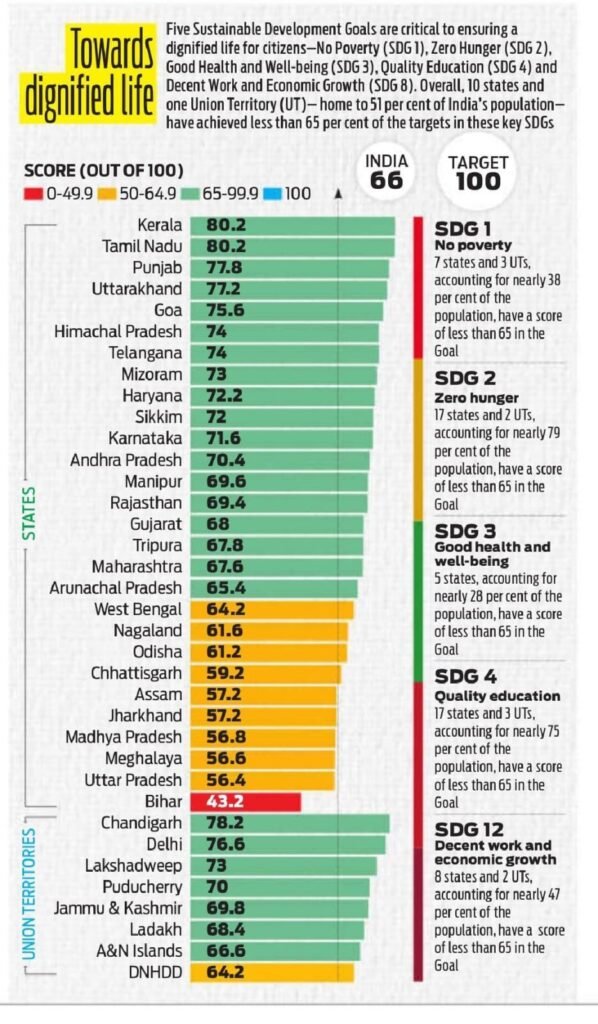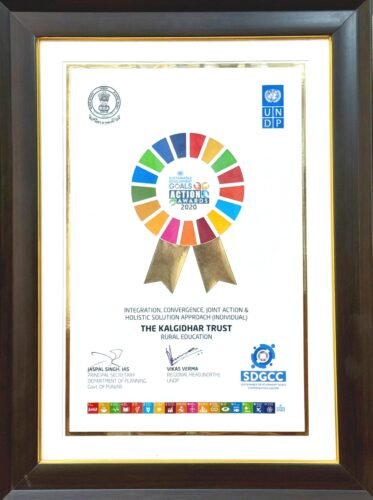A World of Equal Opportunities
Imagine a world where every individual, regardless of their background, has access to a life of dignity—free from poverty, hunger, and preventable diseases. A world where quality education and sustainable employment are not privileges but fundamental rights. This vision is at the core of the United Nations’ Sustainable Development Goals (SDGs), a global blueprint for a better future. Among these, five SDGs stand out as the foundation of human progress: No Poverty (SDG 1), Zero Hunger (SDG 2), Good Health and Well-being (SDG 3), Quality Education (SDG 4), and Decent Work and Economic Growth (SDG 8). Achieving these goals can transform millions of lives and create an inclusive society where no one is left behind.
India’s Struggle with SDG Progress
Despite India’s impressive advancements in technology, infrastructure, and social development, a significant part of the population continues to struggle. Shockingly, 10 states and one Union Territory—collectively home to 51% of the country’s people—have not even met 65% of their SDG targets. This means millions still live in poverty, face food insecurity, lack access to proper healthcare, and struggle to get quality education and well-paying jobs. These disparities highlight the urgent need for targeted interventions and systemic reforms to bridge the gap and accelerate progress toward sustainable development.

Key Areas That Need Urgent Attention
- Poverty & Hunger: One of the biggest challenges in India is the vast economic inequality that leaves a significant portion of the population struggling to meet their basic needs. Strengthening income support programs, improving food distribution networks, and expanding social security measures are essential steps to eradicate extreme poverty and hunger.
- Healthcare: The pandemic exposed major gaps in India’s healthcare infrastructure, especially in rural areas. Affordable and accessible healthcare services, increased investment in medical facilities, and awareness programs on preventive healthcare can drastically improve the well-being of millions.
- Education: Education is the key to breaking the cycle of poverty, yet many children in rural and underprivileged areas lack access to proper schooling. Investing in school infrastructure, training more teachers, and ensuring digital connectivity for remote learning can empower the next generation with knowledge and opportunities.
- Employment & Economic Growth: Creating sustainable job opportunities with fair wages is crucial to boosting economic growth and ensuring financial stability for all. Vocational training, entrepreneurship support, and policies that encourage businesses to invest in skill development can help build a strong, resilient workforce.
Collaborative Action for a Dignified Future
Achieving these SDG targets requires the collective efforts of governments, businesses, NGOs, and communities. It’s not just about policies; it’s about action. Sustainable solutions, public-private partnerships, and grassroots initiatives can drive meaningful change. Addressing these challenges is not merely an obligation—it is a moral duty that will define India’s future.
Kalgidhar Society’s Role in SDG Progress
Amid these challenges, some organizations are making a tangible impact. The Kalgidhar Society and Akal Academy Baru Sahib have been recognized for their remarkable contribution to rural education. In September 2020, they were honored with the SDG Action Award by the Punjab Planning Department and the United Nations Development Programme (UNDP). Their efforts in setting up hundreds of schools in underserved regions and collaborating with local governments have significantly improved educational access for rural students. Such initiatives highlight the power of grassroots efforts in achieving national and global development goals.
Be a Part of the Change
Creating a dignified future for India’s struggling millions is not just the responsibility of policymakers and organizations—it requires collective participation. Each one of us can contribute by supporting education initiatives, promoting healthcare awareness, and advocating for fair employment practices. Join the movement for change at www.educatetosave.com and www.csrforchange.com. Every effort, no matter how small, brings us closer to a more equitable and just society.














Add comment